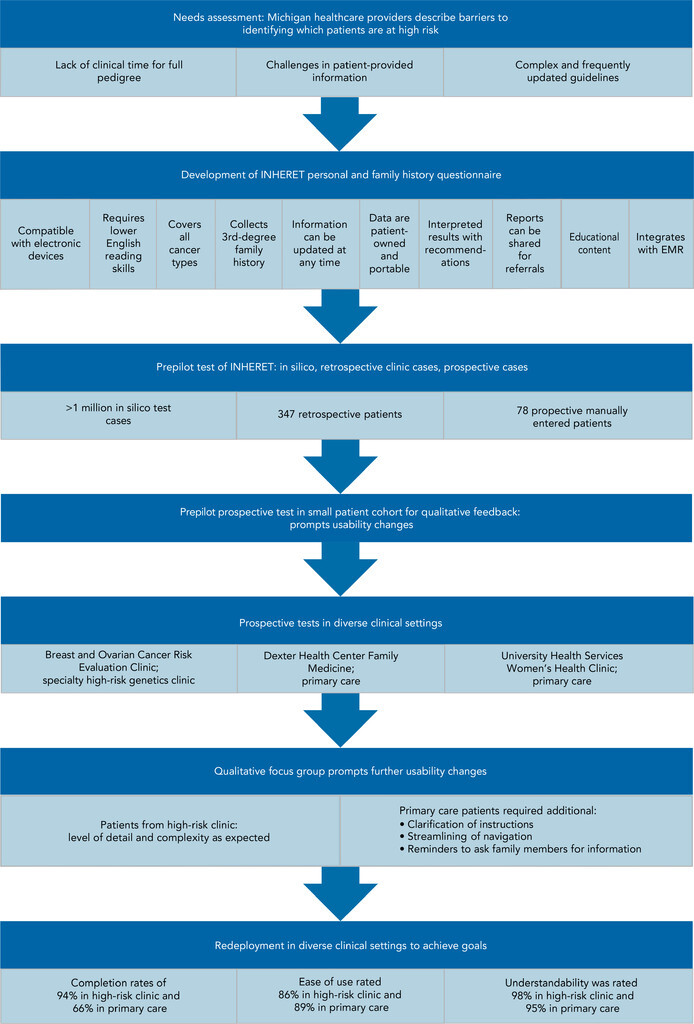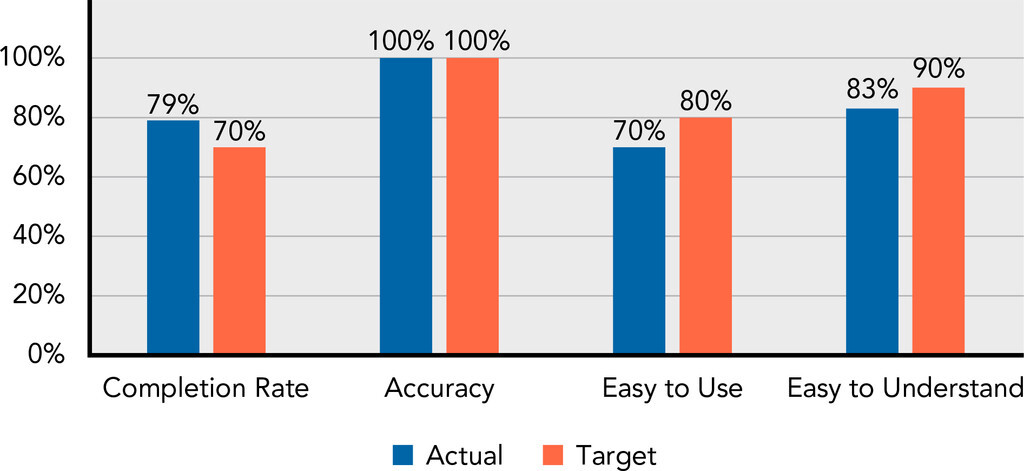Research from INHERET Published in JNCCN
By Camren Clouthier | January 18 2022Research from INHERET, led by Lynn McCain and Drs. Lee Schroeder and David Keren from the Department of Pathology, and colleagues from across Michigan Medicine, were just published in the Journal of the National Comprehensive Cancer Network (JNCCN). The publication analyzes the implementation of INHERET's online tool, which provides information about family history as it relates to cancer risks.
 "To create an online tool to facilitate risk evaluation and guideline-based referrals, our team undertook a needs assessment in Michigan," describes McCain. "We wanted to enable patients to provide a complete personal and 3rd-degree family history in a setting where they could save the work and return [later]."
"To create an online tool to facilitate risk evaluation and guideline-based referrals, our team undertook a needs assessment in Michigan," describes McCain. "We wanted to enable patients to provide a complete personal and 3rd-degree family history in a setting where they could save the work and return [later]."
"We’re very excited about this publication," says Dr. Keren. "INHERET has been working on this project for about 8 years."
 The team interviewed healthcare providers about barriers to identifying high-risk patients and two main issues surfaced: insufficient clinical time to complete a family history and data collected in the clinic lacking sufficient accuracy. Moreover, implementation of recommendations in NCCN Clinical Practice Guidelines in Oncology (NCCN Guidelines) was hampered by their complexity and frequent updates.
The team interviewed healthcare providers about barriers to identifying high-risk patients and two main issues surfaced: insufficient clinical time to complete a family history and data collected in the clinic lacking sufficient accuracy. Moreover, implementation of recommendations in NCCN Clinical Practice Guidelines in Oncology (NCCN Guidelines) was hampered by their complexity and frequent updates.
To carry out the investigation, the team obtained paper questionnaires used in genetics clinics, such as the Michigan Medicine Breast and Ovarian Cancer Risk Evaluation Clinic (BOCREC), to ascertain family history. A web-based form tied to a Microsoft SQL database housed on secure, HIPAA-compliant servers within the University of Michigan firewall was created. Patients were invited by BOCREC schedulers via a mailed card or an email link to create an account and enter their data. In PC clinics, providers offered cards with a link. No patients were recruited by anyone with ties to INHERET, Inc.; informed consent was completed online.
Retrospective testing was completed using 347 historical patients from BOCREC and 78 manually generated patients to ensure a broad representation of family structures. INHERET reports were 100% concordant when compared with genetic counselor clinical determinations. The understandability expectation was set at 90%, having predicted that some patients may experience language barriers, especially because the Ann Arbor–area population includes immigrants from >100 countries. "Results revealed that INHERET met or exceeded targets for completion rate and accuracy. However, it fell somewhat short on ease of use and understandability in this early test," notes McCain.
 In light of the initial results, experts undertook a second round of qualitative focus group interviews to refine INHERET. "Through this process, we discovered that BOCREC patients, having been referred to a specialty clinic, were ready for the questionnaire’s level of detail and complexity and were better prepared and motivated to enter their family and personal histories, given that they already knew they were likely to be at increased cancer risk," describes McCain. In contrast, PC patients required more direction and enhanced phone customer support. Further refinements based on patient suggestions were later made in order to clarify navigation and add reminders that the patient could stop entering data and the work would be saved. "Since the completion of the pilot, this integration has been completed and has been tested successfully in the clinic," concludes McCain. "These studies demonstrated our tool’s efficacy in identifying at risk individuals which provides them with an opportunity to reduce their risks for some of the most common and treacherous forms of cancer, such as breast, ovarian and colon, by as much as 96%," explains Keren. "I am so proud of our outstanding team and their success."
In light of the initial results, experts undertook a second round of qualitative focus group interviews to refine INHERET. "Through this process, we discovered that BOCREC patients, having been referred to a specialty clinic, were ready for the questionnaire’s level of detail and complexity and were better prepared and motivated to enter their family and personal histories, given that they already knew they were likely to be at increased cancer risk," describes McCain. In contrast, PC patients required more direction and enhanced phone customer support. Further refinements based on patient suggestions were later made in order to clarify navigation and add reminders that the patient could stop entering data and the work would be saved. "Since the completion of the pilot, this integration has been completed and has been tested successfully in the clinic," concludes McCain. "These studies demonstrated our tool’s efficacy in identifying at risk individuals which provides them with an opportunity to reduce their risks for some of the most common and treacherous forms of cancer, such as breast, ovarian and colon, by as much as 96%," explains Keren. "I am so proud of our outstanding team and their success."
—
The full publication within the Journal of the National Comprehensive Cancer Network (JNCCN) is available here.
 ON THE COVER
ON THE COVER
 ON THE COVER
ON THE COVER
 ON THE COVER
ON THE COVER
 ON THE COVER
ON THE COVER
 ON THE COVER
ON THE COVER
 ON THE COVER
ON THE COVER
 ON THE COVER
ON THE COVER
 ON THE COVER
ON THE COVER
 ON THE COVER
ON THE COVER
 ON THE COVER
ON THE COVER
